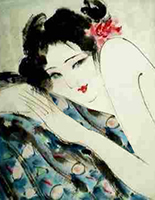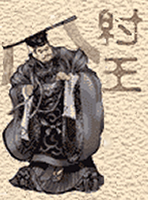 |
|
Da Ji |
Chinese monarchs
were known for their debauchery, which caused the fall of many a dynasty. But
in the female-biased society, the blames were often placed upon the women involved
with them. Da Ji has always been depicted as the worst woman that China has
ever had in its long history.
The legend about
Da Ji was made known by the popular Historical Romance of Apotheosis
(Feng Shen Yanyi). The novel described Da Ji as the incarnation of a silvery
fox that assumed a human form after a thousand years of self cultivation. She
was summoned by Nü Wa, the celestial sovereign,
to corrupt the Di Xin, the tyrant of the powerful state of Shang so that his
people would rise and overthrow him. Incidentally, Di Xin is known historically
as Zhou. Before Da Ji's departure, Nü Wa promised
her an immortal status after her mission was accomplished.
According to
historical record, however, Da Ji was the beautiful daughter of a noble family
named Su in the state of You Su. In 1047 B.C., Zhou, the tyrant of Shang, conquered
the state of Su and took Da Ji as his trophy. By then, the king was in his sixties
and had been in his throne for forty years. He had been known as strong, heroic,
oratory and well versed in music. Under his reign, Shang had become a powerful
and prosperous state. He certainly had his Achilles’ heel, namely, his
infatuated love for women. Ever since Zhou had Da Ji as his concubine, things
began to change, for the worse.
Zhou liked Da
Ji so much that he tried every means to ingratiate himself with her. Da Ji liked
animals, so he built her a zoological Xanadu with a large collection of rare
birds and animals. She liked dancing and singing, so he ordered artists to compose
lewd music and choreograph bawdy dances. Forgetting about state affairs all
together, King Zhou began to spend all his time with Da Ji. He would gather
three thousand guests at one party to enjoy his “pond of wine” and
“forest of meat,” which was cooked meat strips hanging from a wood
of trees. King Zhou would allow the guests to play a cat and mouse game in the
nude among the trees so that Da Ji could be amused. When a maid of honor, daughter
of Lord Jiu, could not bear the sight of such debauchery and protested, King
Zhou had her slain, her father grounded, and his flesh fed to the tyrant's vassals.
Eventually Da
ji became a brute herself. It was said that her greatest joy was to hear people
cry in physical sufferings. Once, as she saw a farmer walking barefoot on the
ice, she ordered his feet be cut off so that she could study it and figure out
the cause of its resistance to cold temperature. In another occasion, she had
a pregnant woman’s belly cut open so that she could satisfy her curiosity
of finding out what happened therein. To verify the old saying that “a
good man’s heart had seven openings,” she had the heart of Bi Gan,
an honest minister, cut out and subjected it to her fertile scrutiny.
 |
| King
Zhou of Shang |
On top of all
those atrocities, Da Ji was best known for her invention of a device of torture
called Paolao: a bronze cylinder heated like a furnace with charcoal until the
sides were extremely hot. Then the victim would be bound on the cylinder and
baked to death. Da Ji would take great delight in the painful cries of the condemned.
While the tyrant
Zhou was occupied with making himself and Da Ji happy, a Zhou1
tribe began to grow increasingly stronger. Its hatred towards the tyrant was
deep-rooted. When Boyi Kao, eldest son of Ji Chang, leader of the Zhou tribe,
visited Chao Ge, capital of Shang, he had a love affair with Da Ji. In his wrath,
the tyrant Zhou had Kao killed and his body grounded. As if it were not enough,
Zhou made Ji Chang drink the soup of his son's flesh before jailing him. Only
after many rescue efforts including intensive bribery was Ji Chang finally released
two years later. Twelve years after Ji Chang’s death, his youngest son
Ji Fa launched an attack against Shang to revenge his family.
The anger and
hatred created by the brutality of tyrant Zhou and Da Ji among their own people
made it easier for Ji Fa to achieve his goal. In the face of the Zhou tribe’s
onslaught, the better armed and once invincible army of Shang suddenly gave
in and many soldiers even turned their weapons against their tyrannical ruler.
Seeing his dynasty doomed, tyrant Zhou committed suicide by setting fire upon
himself. Da Ji was later put to death byJi Fa, king of the new Dynasty of Zhou.
According to
The Historical Romance of Apotheosis (Feng Shen Yanyi), however, after
the fall of the Shang Dynasty, Nü Wa sentenced Da
Ji, the incarnation of a fox, to death instead of making her an immortal as
she had promised because she found her over zealous in doing what she had been
asked to do. Da Ji had made her people so mad that it left Nü Wa no alternative.
Historians today
argued that neither King Zhou of Shang nor Da Ji had committed as many of the
atrocities as the legends claimed. It could be a propaganda ploy on the part
of the Zhou tribe to demonize the couple in order to rally support in their
cause. If that is true, then Da Ji would have been the victim of the first psychological
warfare that history has ever seen.
Note:
The word "Zhou" being all over the place here is really confusing. However,
it is not the case in Chinese. For the Chinese character for "Zhou"
the tyrant is  ,
which reads in a falling tone while the Chinese character for "Zhou"
the tribe is ,
which reads in a falling tone while the Chinese character for "Zhou"
the tribe is  ,
which reads in a level tone. ,
which reads in a level tone.
Text and translation
by Haiwang Yuan, © copyright 2003
Last update: October 5, 2003
|